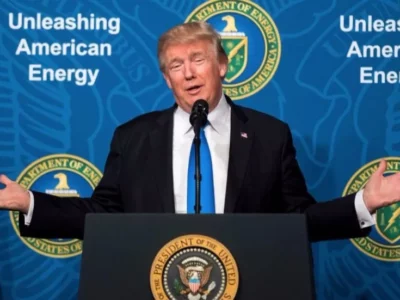2024 Presidential Election
2024: Ending on a Dark Note
It was a pretty good year for the environment – until November 5, that is.
2024 ended on a grim note for anyone who cares about the environment. Donald Trump is once again in the White House. His record in the first term made him in the most anti-environmental President in history. The story of the next four years will be a struggle to limit his damage while doing as much as we can to continue progress at the state level and in the private sector.
CONTINUE READINGWith a Week to Go, Where Do the Elections Stand?
The Presidential, Senate & House elections will have immense repercussions in terms of energy and environment.
This elections seemunusually weighty in its policy implications. In terms of energy and climate policy, the two parties parties are far apart — Republicans favor energy dominance through massive fossil fuel production, Demorats favor clean energy. To the immense frustration of people on both sides, things haven’t moved much since September, when I last wrote …
Continue reading “With a Week to Go, Where Do the Elections Stand?”
CONTINUE READINGThe 2024 Election Outcome Could Boost the Case for Geoengineering
A Trump victory would increase the odds that we will ultimately need to start blocking solar radiation as a last resort to limit climate change.
A Trump victory would increase the odds that we will eventually need to “break the glass and pull the red lever.” To be prepared for that possibility, we would also need to do more in the short term to research various forms of geoengineering, their feasibility, and their potential side effects. Basically, if you decide you’re going to start smoking a lot more cigarettes, you need to be prepared for the greater likelihood you’ll need chemo.
CONTINUE READINGWith 4 Weeks Left, the Election – and the Future of Climate Policy – Hang in the Balance
The White House and control of the House remain toss-ups.
Yhe outcome of the 2024 election will be pivotal for climate and energy policy. With a month to go, things are still incredibly close. Harris has a tiny edge in the electoral college and the Republicans have similar edges in the House and Senate.So hang onto your hats for the final stretch of this rollercoaster ride. A last-minute “October surprise” is still possible, and it’s also possible that polls will turn out wrong.
CONTINUE READINGThe Contract with America
Or, as some critics called it, “the Contract ON America.”
The Contract with America was the brainchild of Newt Gingrich. It was a turning point in American politics: moving the GOP from compromise to confrontation, nationalizing what had previously been locally oriented House races, and shifting the GOP far to the right. There’s a reason they call Gingrich the man who broke Congress.
CONTINUE READINGThe State of the Race
Who will shape federal climate and energy policies? The answer remains too close to call.
Republicans are favored to take control of the Senate, but who will control the House and the Presidency remains too close to call. The implications for climate policy and the future of the planet could be profound.
CONTINUE READINGShould We Be Upset If Candidates Don’t Provide Concrete Policy Plans?
Policy specifics give me something to write blog posts about. But how much should they matter to voters?
After all, you don’t need specifics to know that Trump and Harris have very different views about climate and energy. Should voters care about their failure to go into detail?
CONTINUE READINGThe Tragedy of Indifference
This election will have huge consequences for climate change. Sadly, that doesn’t seem to matter that much at the polls.
The partisan divide is real: Democrats are three times more likely than Republicans to view climate change as a major threat. Even so, a quarter of Republicans agreed with Democrats on this. The problem is that only 37% (almost all Democrats) view climate change as their top priority.
CONTINUE READINGThe Impoundment Gambit
Trump plans to use this unconstitutional strategy to reverse congressional priorities and gut environmental agencies.
Trump’s claim of constitutional control over spending would allow him to slash social security or environmental protection with a single stroke his pen, and there would be nothing Congress could do about it.
CONTINUE READINGHypothetically Speaking: What if Trump Had Won in 2020?
In terms of climate policy, the short answer is “nearly total destruction.”
Trump’s end point from his first term — zeroing out federal climate action — would have been his starting point after reelection. The next steps would have been an effort to end state-level and private climate action, and a massive increase in oil & gas production and use.
CONTINUE READING








